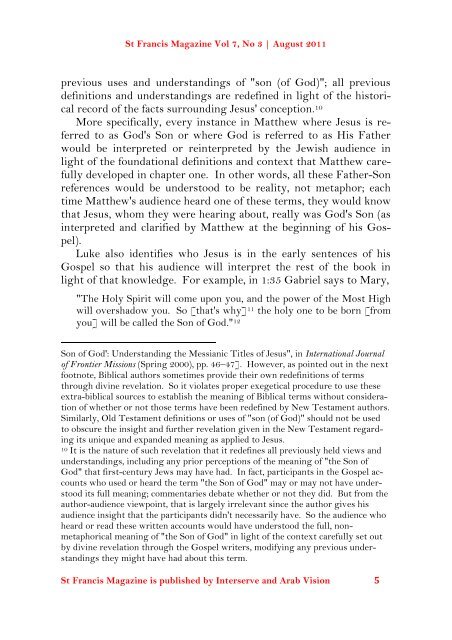Jesus, the Son of God: Biblical meaning, Muslim Understanding ...
Jesus, the Son of God: Biblical meaning, Muslim Understanding ...
Jesus, the Son of God: Biblical meaning, Muslim Understanding ...
Create successful ePaper yourself
Turn your PDF publications into a flip-book with our unique Google optimized e-Paper software.
St Francis Magazine Vol 7, No 3 | August 2011!previous uses and understandings <strong>of</strong> "son (<strong>of</strong> <strong>God</strong>)"; all previousdefinitions and understandings are redefined in light <strong>of</strong> <strong>the</strong> historicalrecord <strong>of</strong> <strong>the</strong> facts surrounding <strong>Jesus</strong>' conception. 10More specifically, every instance in Mat<strong>the</strong>w where <strong>Jesus</strong> is referredto as <strong>God</strong>'s <strong>Son</strong> or where <strong>God</strong> is referred to as His Fa<strong>the</strong>rwould be interpreted or reinterpreted by <strong>the</strong> Jewish audience inlight <strong>of</strong> <strong>the</strong> foundational definitions and context that Mat<strong>the</strong>w carefullydeveloped in chapter one. In o<strong>the</strong>r words, all <strong>the</strong>se Fa<strong>the</strong>r-<strong>Son</strong>references would be understood to be reality, not metaphor; eachtime Mat<strong>the</strong>w's audience heard one <strong>of</strong> <strong>the</strong>se terms, <strong>the</strong>y would knowthat <strong>Jesus</strong>, whom <strong>the</strong>y were hearing about, really was <strong>God</strong>'s <strong>Son</strong> (asinterpreted and clarified by Mat<strong>the</strong>w at <strong>the</strong> beginning <strong>of</strong> his Gospel).Luke also identifies who <strong>Jesus</strong> is in <strong>the</strong> early sentences <strong>of</strong> hisGospel so that his audience will interpret <strong>the</strong> rest <strong>of</strong> <strong>the</strong> book inlight <strong>of</strong> that knowledge. For example, in 1:35 Gabriel says to Mary,"The Holy Spirit will come upon you, and <strong>the</strong> power <strong>of</strong> <strong>the</strong> Most Highwill overshadow you. So [that's why] 11 <strong>the</strong> holy one to be born [fromyou] will be called <strong>the</strong> <strong>Son</strong> <strong>of</strong> <strong>God</strong>." 12!!!!!!!!!!!!!!!!!!!!!!!!!!!!!!!!!!!!!!!!!!!!!!!!!!!!!!!!<strong>Son</strong> <strong>of</strong> <strong>God</strong>': <strong>Understanding</strong> <strong>the</strong> Messianic Titles <strong>of</strong> <strong>Jesus</strong>", in International Journal<strong>of</strong> Frontier Missions (Spring 2000), pp. 46–47]. However, as pointed out in <strong>the</strong> nextfootnote, <strong>Biblical</strong> authors sometimes provide <strong>the</strong>ir own redefinitions <strong>of</strong> termsthrough divine revelation. So it violates proper exegetical procedure to use <strong>the</strong>seextra-biblical sources to establish <strong>the</strong> <strong>meaning</strong> <strong>of</strong> <strong>Biblical</strong> terms without consideration<strong>of</strong> whe<strong>the</strong>r or not those terms have been redefined by New Testament authors.Similarly, Old Testament definitions or uses <strong>of</strong> "son (<strong>of</strong> <strong>God</strong>)" should not be usedto obscure <strong>the</strong> insight and fur<strong>the</strong>r revelation given in <strong>the</strong> New Testament regardingits unique and expanded <strong>meaning</strong> as applied to <strong>Jesus</strong>.10 It is <strong>the</strong> nature <strong>of</strong> such revelation that it redefines all previously held views andunderstandings, including any prior perceptions <strong>of</strong> <strong>the</strong> <strong>meaning</strong> <strong>of</strong> "<strong>the</strong> <strong>Son</strong> <strong>of</strong><strong>God</strong>" that first-century Jews may have had. In fact, participants in <strong>the</strong> Gospel accountswho used or heard <strong>the</strong> term "<strong>the</strong> <strong>Son</strong> <strong>of</strong> <strong>God</strong>" may or may not have understoodits full <strong>meaning</strong>; commentaries debate whe<strong>the</strong>r or not <strong>the</strong>y did. But from <strong>the</strong>author-audience viewpoint, that is largely irrelevant since <strong>the</strong> author gives hisaudience insight that <strong>the</strong> participants didn't necessarily have. So <strong>the</strong> audience whoheard or read <strong>the</strong>se written accounts would have understood <strong>the</strong> full, nonmetaphorical<strong>meaning</strong> <strong>of</strong> "<strong>the</strong> <strong>Son</strong> <strong>of</strong> <strong>God</strong>" in light <strong>of</strong> <strong>the</strong> context carefully set outby divine revelation through <strong>the</strong> Gospel writers, modifying any previous understandings<strong>the</strong>y might have had about this term.St Francis Magazine is published by Interserve and Arab Vision!%!







![Reflections on Surah Fatiha and the Lord's Prayer[1] - St.Francis ...](https://img.yumpu.com/49377951/1/184x260/reflections-on-surah-fatiha-and-the-lords-prayer1-stfrancis-.jpg?quality=85)








